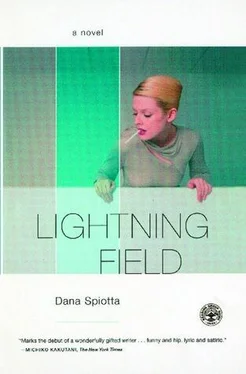Red. She was supposed to think about the red she was seeing-as he touched the parts of her he was touching. No, not think about, of course, but meditate on the red she was seeing. But that’s not it either — she must just feel the red, become thered. That was the first color. Then Beryl instructed her to take control of that vivid, anxiety-tense red and make it into a peaceful medium blue. A low, saturated pacific blue. Then transform blue to white, make it drain slowly to a perfect celestial white of complete mind-body-soul equilibrium. But she had first to think of red. But not think, feel red, feel it turn to another color from someplace unwilled and natural in her person. She must “feel” the color and “see” the touches. All these “supposed to”s and “must”s in order to relax — it was nearly funny, wasn’t it.
He switched to long pulling strokes on the back of her thigh. She felt where her muscles attached to her bones. It felt to her that he was gently lifting muscle from the bone, creating a space deep inside where everything was generally muddled tightly together, as if he shared the weight of her body for a moment. Lorene found this pleasurable, his going against the constant, everyday burdens of being a body. What did he feel, or see, or think, the toucher? The professional toucher?
When she was without money, before she had the restaurants, she had only her beauty, her taste, and her style to recommend her. She had to market professional glamour. Lorene guessed she must have been the first life-stylist. She figured out how to sell her life-style consultancy to the rich, particularly rich men. Men who spent all their energy making money and couldn’t be bothered with how to spend it. Her first client was Joseph Walker, some sort of software tycoon. She was already a personal shopper then, starting at Neiman Marcus and then quickly going freelance, working not only to wardrobe Beverly Hills second wives in the taste- and wealth-indicating appropriate designers befitting their newly acquired positions, but she also helped men like Joseph do their Christmas, birthday, andanniversary shopping. She would buy perfume and lingerie for his ex-wife or his current girlfriend or his secretary. She began also to help him pick his own wardrobe, and even guided him as to what kind of aftershave he should wear, where he should get his hair cut, and what sorts of plastic surgery he might consider. In short, he paid her to tell him how to spend the money he worked so hard to earn. And Lorene found she could do this very well. When she had finished her makeover, and he looked, if not great, then at least vastly improved, he asked her to have a drink at his Westwood condominium. Lorene was, of course, a bit wary of Joseph having fallen into an infatuation with her (such transference was only natural, as dependency and desire get conflated in any quasitherapeutic situation, and some men — she particularly had suspicions about Joseph— just really got off on being told what to do), but she nevertheless met him to celebrate their success. She entered through the front door, and although Joseph was dressed well and impeccably groomed, she saw that her work in fact had just begun.
He poured Chivas Regal into thick-based hexagonal highball glasses.
“A man of your position shouldn’t use glasses like these,” she said, twenty-two and somehow supremely confident in all the things people found so difficult to navigate. “And only a very young man should pour blended scotch, or a woman. It’s too cliché for someone of your age. You should pour some obscure but delicious Skye or Islay peaty single malt — Talisker, perhaps, or Ardbeg.”
Joseph looked at her and smiled. He took out a ballpoint pen and indicated to her she should write it down. Lorene took the pen and then gestured with it.
“Get a Pelikan, or — just not a Mont Blanc, OK, Joseph?”
“What else, Lorene?”
“Well, where do we start? It isn’t a matter of simply spending-money. . ” The art on the walls — there wasn’t any. She would give him the names of some galleries. His music collection — awful. She composed a list. A certain amount of fifties and early sixties jazz, some well-chosen classical. And opera, lots and lots of it. She must offset his techno geekiness with something Old World and unexpected. Emotional and passionate. She found it easy. She just thought of what would impress and surprise her. What things she could discover in a man like Joseph that would intrigue her as a woman and make him seem unusual and impressive. It was a kind of love, or a creative sympathy. She put the pen down and pushed it toward him. He stared at her with a child’s conspiratorial joy.
“Joe — which is a great name, by the way, no need to change that — Joe, you need one sort of eccentric thing which you must be quite passionate about. For example — German cabaret music. It’s a little kinky, but in a classy sort of old-school way. Deep, throaty lesbian chanteuses, lots of Kurt Weill and women named Ute. What do you think?” He was nodding, smiling with her. She warmed to it. A real makeover.
Lorene, over a mere two weeks, had him paying attention to things he hadn’t before — the sort of crucial details that indicated an examined life-style. She had him buy Egyptian cotton sheets of a ridiculously sumptuous thread count (they must be changed every day without fail). She had him collect wine — a cliché, true, but a necessary and sensuous amenity. A temperature-controlled, five-hundred-bottle cellar to start, which she filled with auction-bought bottles of Burgundy. (“You are either a Burgundy man or a Bordeaux man — you must chooseand then be quite fixed in your opinion. You’ll take Burgundy, it’s much more complicated, and indicates sophistication. Not just mind-blowing Romanée-Conti, mind you, but you’ll buy obscure monopole Grands Crus that only collectors and, of course, you know. And, yes, they are obscenely expensive.”) He happily complied. She created a book collection — an extensive inventory of contemporary fiction, plus some obligatory modernist giants. She suggested he read the first chapter of each, when he could. He of course wouldn’t, so she composed a paragraph or two about each writer and what was thought of him or her. She gave him a list of movies to rent. She, in short, created a life for him to come home to and slip into. He loved it. He had so little time. He offered her a weekly stipend, and she began to read the L.A. Times and the New York Times for him. She gave him weekly clippings of must-read items, which were further distilled to underlined, must-read sentences, to save even more time. She devised suggested conversation topics. When he had no time to read those, she offered short opinionated summaries of topics. She would even dine with him and give him conversation-style evaluations, a sort of dating report card, and give him (recited) precise notes. He was remarkably improved. Lorene imagined he could fool almost any woman into thinking he was interesting and had a full, exuberant life. From Joseph she had other men. Mock dates were very popular; she became quite succinct in her critiques: listen more, talk about this movie, hate that book. Make eye contact. Don’t inflect your sentences so. Mostly she gave them lots of encouragement, and she discovered the sort of heart-wrenching, desperate loneliness of certain kinds of men. It wasn’t that Lorene devised false lives for these men, as she sometimes accused herself, but that she had discovered shehad a laser accuracy for reading other people’s desires and vanities, and she could help them actualize those desires as styles and traits and purchasable objects in the world. She brought out the dark longings and turned them into lists and packages and simple, easy steps. Lorene learned what every confidence woman learns: all our desires are the same, we all want the same things, we are all desperate in the same way. And the first to declare an answer, especially a vehement, confident answer, wins. It was all in how you framed it. It was an issue of syntax. If you say, This is the one crucial detail that you must know, they will listen. And that was what she was selling, not a list of books — because, really, it was all so arbitrary — but a confidence, a way of thinking about the power of things to transform your life that made it work. She was selling faith, of course.
Читать дальше












